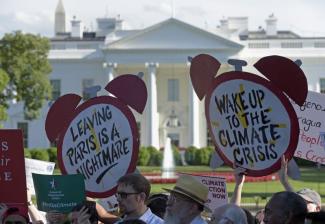Global Governance
Setting the wrong example

Trump promised to stop “implementation of the non-binding Paris accord and the draconian financial and economic burdens the agreement imposes on our country”. This is nonsense. By definition, a non-binding agreement cannot be draconian. The truth is that all commitments made in the context of the Paris Agreement are voluntary, determined by the national governments themselves.
The president was probably not aware of it, but his statement meant renouncing any claim to world leadership. Climate change means that Earth is like a leaking boat. Temperatures are rising, and the sea level is too. Anyone claiming leadership, must act to solve the problem. Trump wants others to plug the leak, denying his nation’s share of responsibility. We know that Paris Agreement commitments need “racheting up”. Otherwise, global warming will spin out of control.
So far, all nations – except Syria and Nicaragua – have joined the voluntary efforts. The USA, however, is an indispensable nation. Its funding, science and engagement are needed. Nonetheless, some progress on international climate protection may prove feasible in spite of the White House’s neglect of duty.
Trump is unpopular at home and faces serious legal problems. He may lose his majorities in Congress next year. The governors of California, New York and other states oppose his decision on Paris, and so do many mayors. The international community must get in touch and cooperate with these leaders. It helps that the heads of many big corporations disagree with Trump’s stance too.
The good news is that regardless of his decision the USA is on course to reach the targets Trump’s predecessor Barack Obama set for 2020. The reason is that major investors will not be building big new fossil-fuel dependent facilities. They know that such investments would be extremely risky.
Another positive aspect is that Trump’s diplomats will now be sidelined in global climate talks. A party that is leaving has less scope for slowing others down.
Trump will find few allies for his anti-Paris agenda. Saudi Arabia and Russia may appreciate his step. Both depend on fossil-fuel exports, have a long history of failing to diversify their economies and are run by regimes that are too afraid of their people to grant fundamental civil liberties. That may suit Trump’s authoritarian leanings, but it hurts American leadership. The USA prevailed in the cold war because its freedom and democracy was inspiring. The soft power of setting attractive examples proved as important as the hard power of military force.
Most governments of developing countries know that climate change is real and their nations’ fates depend on controlling the phenomenon. They are likely to rally around the powers that want to move ahead, like the EU and China.
Kenya, by the way, recently inaugurated a new railway linking Nairobi to Mombasa. It is one of many examples of China funding infrastructure in developing countries at a time when the White House wants to slash foreign aid. Which approach will convince more Africans is not hard to tell. Railways, of course, are comparatively energy efficient.
The international community must now show that it is determined to protect the climate and isolate the erratic president in the White House. In view of global challenges like climate change, Trump’s thinking in terms of zero-sum games, in which someone’s gain is always someone elses loss, is no longer acceptable.
Hans Dembowski is editor in chief of D+C Development and Cooperation / E+Z Entwicklung und Zusammenarbeit.
euz.editor@fs-medien.de








